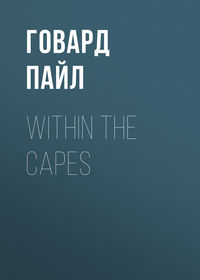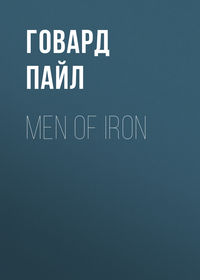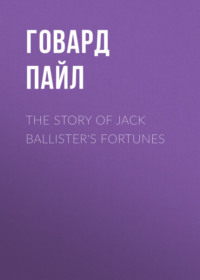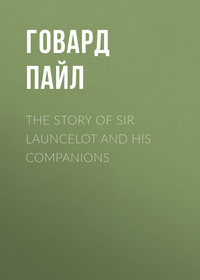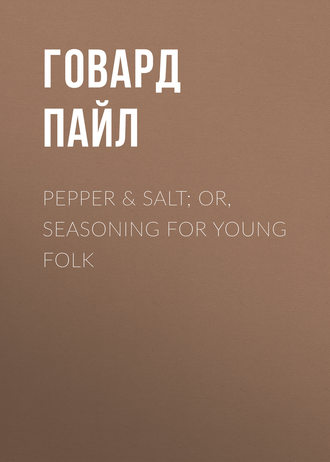 полная версия
полная версияPepper & Salt; or, Seasoning for Young Folk

Howard Pyle
Pepper & Salt / or, Seasoning for Young Folk
Preface
Here, my little man, you may hold my cap and bells, – and you, over there, may hold the bauble! Now, then, I am ready to talk as a wise man should and am a giddy-pated jester no longer!
This is what I have to say:
One must have a little pinch of seasoning in this dull, heavy life of ours; one should never look to have all the troubles, the labors, and the cares, with never a whit of innocent jollity and mirth. Yes, one must smile now and then, if for nothing else than to lift the corners of the lips in laughter that are only too often dragged down in sorrow.
It is for this that I sit here now, telling you all manner of odd quips and jests until yon sober, wise man shakes his head and goes his way, thinking that I am even more of a shallow-witted knave than I really am. But, prut! Who cares for that? I am sure that I do not if you do not.
Yet listen! One must not look to have nothing but pepper and salt in this life of ours – no, indeed! At that rate we would be worse off than we are now. I only mean that it is a good and pleasant thing to have something to lend the more solid part a little savor now and then!
So, here I'll sit; and, perhaps, when you have been good children, and have learned your lessons or done your work, your mother will let you come and play a little while with me. I will always be ready and waiting for you here, and I will warrant your mother that I will do you no harm with anything that I may tell you. If I can only make you laugh and be merry for a little while, then my work will be well done, and I will be glad in the doing of it.
And now give me my cap and bells again, for my wits are growing cold without them; and you will be pleased to reach me my bauble once more, for I love to have him by me.
Will you be seated? And you, over there, seat the baby on the grass! Are you ready? Very well; then I will tell you a story, and it shall be about "The Skillful Huntsman."
The Skillful Huntsman
Once upon a time there was a lad named Jacob Boehm, who was a practical huntsman.
One day Jacob said to his mother, "Mother, I would like to marry Gretchen – the nice, pretty little daughter of the Herr Mayor."
Jacob's mother thought that he was crazy. "Marry the daughter of the Herr Mayor, indeed! You want to marry the daughter of the Herr Mayor? Listen; many a man wants and wants, and nothing comes of it!"
That was what Jacob Boehm's mother said to him.
But Jacob was deaf in that ear; nothing would do but his mother must go to the Herr Mayor, and ask for leave for him to marry Gretchen. And Jacob begged and begged so prettily that at last his mother promised to go and do as he wished. So off she went, though doubt was heavy in her shoes, for she did not know how the Herr Mayor would take it.
"So Jacob wants to marry Gretchen, does he?" said the Herr Mayor.
Yes; that was what Jacob wanted.
"And is he a practical huntsman?" said the Herr Mayor.
Oh yes, he was that.
"So good," said the Herr Mayor. "Then tell Jacob that when he is such a clever huntsman as to be able to shoot the whiskers off from a running hare without touching the skin, then he can have Gretchen."
Then Jacob's mother went back home again. "Now," said she, "Jacob will, at least, be satisfied."
"Yes," said Jacob, when she had told him all that the Herr Mayor had said to her, "that is a hard thing to do; but what one man has done, another man can." So he shouldered his gun, and started away into the world to learn to be as clever a huntsman as the Herr Mayor had said.
He plodded on and on until at last he fell in with a tall stranger dressed all in red.
"Where are you going, Jacob?" said the tall stranger, calling him by his name, just as if he had eaten pottage out of the same dish with him.
"I am going," said Jacob, "to learn to be so clever a huntsman that I can shoot the whiskers off from a running hare without touching the skin."
"That is a hard thing to learn," said the tall stranger.
Yes; Jacob knew that it was a hard thing; but what one man had done another man could do.
"What will you give me if I teach you to be as clever a huntsman as that?" said the tall stranger.
"What will you take to teach me?" said Jacob; for he saw that the stranger had a horse's hoof instead of a foot, and he did not like his looks, I can tell you.
"Oh, it is nothing much that I want," said the tall man; "only just sign your name to this paper – that is all."
But what was in the paper? Yes; Jacob had to know what was in the paper before he would set so much as a finger to it.
Oh, there was nothing in the paper, only this: that when the red one should come for Jacob at the end of ten years' time, Jacob should promise to go along with him whithersoever he should take him.
At this Jacob hemmed and hawed and scratched his head, for he did not know about that. "All the same," said he, "I will sign the paper, but on one condition."
At this the red one screwed up his face as though he had sour beer in his mouth, for he did not like the sound of the word "condition." "Well," said he, "what is the condition?"
"It is only this," said Jacob: "that you shall be my servant for the ten years, and if, in all that time, I should chance to ask you a question that you cannot answer, then I am to be my own man again."
Oh, if that was all, the red man was quite willing for that.
Then he took Jacob's gun, and blew down into the barrel of it. "Now," said he, "you are as skillful a huntsman as you asked to be."
"That I must try," said Jacob. So Jacob and the red one went around hunting here and hunting there until they scared up a hare. "Shoot!" said the red one; and Jacob shot. Clip! off flew the whiskers of the hare as neatly as one could cut them off with the barber's shears.
"Yes, good!" said Jacob, "now I am a skillful huntsman."
Then the stranger in red gave Jacob a little bone whistle, and told him to blow in it whenever he should want him. After that Jacob signed the paper, and the stranger went one way and he went home again.
Well, Jacob brushed the straws off from his coat, and put a fine shine on his boots, and then he set off to the Herr Mayor's house.
"How do you find yourself, Jacob?" said the Herr Mayor.
"So good," said Jacob.
"And are you a skillful huntsman now?" said the Herr Mayor.
Oh yes, Jacob was a skillful huntsman now.
Yes, good! But the Herr Mayor must have proof of that. Now, could Jacob shoot a feather out of the tail of the magpie flying over the trees yonder?
Oh yes! nothing easier than that. So Jacob raised the gun to his cheek. Bang! went the gun, and down fell a feather from the tail of the magpie. At this the Herr Mayor stared and stared, for he had never seen such shooting.
"And now may I marry Gretchen?" said Jacob.
At this the Herr Mayor scratched his head, and hemmed and hawed. No; Jacob could not marry Gretchen yet, for he had always said and sworn that the man who should marry Gretchen should bring with him a plough that could go of itself, and plough three furrows at once. If Jacob would show him such a plough as that, then he might marry Gretchen and welcome. That was what the Herr Mayor said.
Jacob did not know how about that; perhaps he could get such a plough, perhaps he could not. If such a plough was to be had, though, he would have it. So off he went home again, and the Herr Mayor thought that he was rid of him now for sure and certain.
But when Jacob had come home, he went back of the woodpile and blew a turn or two on the little bone whistle that the red stranger had given him. No sooner had he done this than the other stood before him as suddenly as though he had just stepped out of the door of nowheres.
"What do you want, Jacob?" said he.
"I would like," said Jacob, "to have a plough that can go by itself and plough three furrows at once."
"That you shall have," said the red one. Then he thrust his hand into his breeches pocket, and drew forth the prettiest little plough that you ever saw. He stood it on the ground before Jacob, and it grew large as you see it in the picture. "Plough away," said he, and then he went back again whither he had come.
So Jacob laid his hands to the plough and – whisk! – away it went like John Stormwetter's colt, with Jacob behind it. Out of the farm-yard they went, and down the road, and so to the Herr Mayor's house, and behind them lay three fine brown furrows, smoking in the sun.
When the Herr Mayor saw them coming he opened his eyes, you may be sure, for he had never seen such a plough as that in all of his life before.
"And now," said Jacob, "I should like to marry Gretchen, if you please."
At this the Herr Mayor hemmed and hawed and scratched his head again. No; Jacob could not marry Gretchen yet, for the Herr Mayor had always said and sworn that the man who married Gretchen should bring with him a purse that always had two pennies in it and could never be emptied, no matter how much was taken out of it.
Jacob did not know how about that; perhaps he could get it and perhaps he could not. If such a thing was to be had, though, he would have it, as sure as the Mecklenburg folks brew sour beer. So off he went home again, and the Herr Mayor thought that now he was rid of him for certain.
But Jacob went back of the woodpile and blew on his bone whistle again, and once more the red one came at his bidding.
"What will you have now?" said he to Jacob.
"I should like," said Jacob, "to have a purse which shall always have two pennies in it, no matter how much I take out of it."
"That you shall have," said the red one; whereupon he thrust his hand into his pocket, and fetched out a beautiful silken purse with two pennies in it. He gave the purse to Jacob, and then he went away again as quickly as he had come.
After he had gone, Jacob began taking pennies out of his purse and pennies out of his purse, until he had more than a hatful – hui! I would like to have such a purse as that.
Then he marched off to the Herr Mayor's house with his chin up, for he might hold his head as high as any, now that he had such a purse as that in his pocket. As for the Herr Mayor, he thought that it was a nice, pretty little purse; but could it do this and that as he had said?
Jacob would show him that; so he began taking pennies and pennies out of it, until he had filled all the pots and pans in the house with them. And now might he marry Gretchen?
Yes; that he might! So said the Herr Mayor; for who would not like to have a lad for a son-in-law who always had two pennies more in his purse than he could spend.
So Jacob married his Gretchen, and, between his plough and his purse, he was busy enough, I can tell you.
So the days went on and on and on until the ten years had gone by and the time had come for the red one to fetch Jacob away with him. As for Jacob, he was in a sorry state of dumps, as you may well believe.
At last Gretchen spoke to him. "See, Jacob," said she, "what makes you so down in the mouth?"
"Oh! nothing at all," said Jacob.
But this did not satisfy Gretchen, for she could see that there was more to be told than Jacob had spoken. So she teased and teased, until at last Jacob told her all, and that the red one was to come the next day and take him off as his servant, unless he could ask him a question which he could not answer.
"Prut!" said Gretchen, "and is that all? Then there is no stuffing to that sausage, for I can help you out of your trouble easily enough." Then she told Jacob that when the next day should come he should do thus and so, and she would do this and that, and between them they might cheat the red one after all.
So, when the next day came, Gretchen went into the pantry and smeared herself all over with honey. Then she ripped open a bed and rolled herself in the feathers.
By-and-by came the red one. Rap! tap! tap! he knocked at the door.
"Are you ready to go with me now, Jacob?" said he.
Yes; Jacob was quite ready to go, only he would like to have one favor granted him first.
"What is it that you want?" said the red one.
"Only this," said Jacob: "I would like to shoot one more shot out of my old gun before I go with you."
Oh, if that was all, he might do that and welcome. So Jacob took down his gun, and he and the red one went out together, walking side by side, for all the world as though they were born brothers.
By-and-by they saw a wren. "Shoot at that," said the red one.
"Oh no," said Jacob, "that is too small."
So they went on a little farther.
By-and-by they saw a raven. "Shoot at that, then," said the red one.
"Oh no," said Jacob, "that is too black."
So they went on a little farther.
By-and-by they came to a ploughed field, and there was something skipping over the furrows that looked for all the world like a great bird. That was Gretchen; for the feathers stuck to the honey and all over her, so that she looked just like a great bird.
"Shoot at that! shoot at that!" said the red one, clapping his hands together.
"Oh yes," said Jacob, "I will shoot at that." So he raised his gun and took aim. Then he lowered his gun again. "But what is it?" said he.
At this the red one screwed up his eyes, and looked and looked, but for the life of him he could not tell what it was.
"No matter what it is," said he, "only shoot and be done with it, for I must be going."
"Yes, good! But what is it?" said Jacob.
Then the red one looked and looked again, but he could tell no better this time than he could before. "It may be this and it may be that," said he. "Only shoot and be done with it, for they are waiting for me at home."
"Yes, my friend," said Jacob, "that is all very good; only tell me what it is and I will shoot."
"Thunder and lightning!" bawled the red one, "I do not know what it is!"
"Then be off with you!" said Jacob, "for, since you cannot answer my question, all is over between us two."
At this the red one had to leave Jacob, so he fled away over hill and dale, bellowing like a bull.
As for Jacob and Gretchen, they went back home together, very well pleased with each other and themselves.
And the meaning of all this is, that many anotherman beside Jacob Boehm would find himselfin a pretty scrape only for his wife.TWO OPINIONS
(Ye first opinion)A noisy chattering Magpie onceA talking gabbling hairbrained dunceCame by where a sign-post stood.He nodded his head with a modish airAnd said "good day" for he wasn't awareThat the sign-post pointing its finger thereWas only a block of wood.Quoth he, "An exceedingly sultry day.T'is more like June than the first of May."The post said never a word."I've just dropped over from Lincolnshire.My home is in the Cathedral Spire —The air is cooler and purer the higherYou get – as you've doubtless heard."So on he chattered with never a stop,And on and on till you'd think he would drop.(The post was dumb as your hat.)But so as the pie could say his sayHe didn't care whether it spoke all day;For thus he observed as he walked away —"An intelligent creature that."(Ye second opinion)Now once when the sky was pouring rain,The Magpie chanced to come by again —And there stood the post in the wet."Helloa." said the Magpie. "What you herePray tell me I beg is there sheltering near —A terrible day for this time of the year.T'would make a Saint Anthony fret.""I beg your pardon – I didn't quite hear."(Then louder) "I say is there sheltering near"But the post was as dumb as Death."What can't you answer a question prayYou will not – No – Then I'll say good-day."And flirting his tail he walked away."You'r a fool." (this under his breath.)L'ENVOYThe moral that this story tracesIs – Circumstances alter cases.Howard PyleYe song of ye foolish old woman
I saw an old woman go up a steep hill,And she chuckled and laughed, as she went, with a will.And yet, as she went,Her body was bent,With a load as heavy as sins in Lent."Oh! why do you chuckle, old woman;" says I,"As you climb up the hill-side so steep and so high?""Because, don't you see,I'll presently be,At the top of the hill. He! he!" says she.I saw the old woman go downward again;And she easily travelled, with never a pain;Yet she loudly cried,And gustily sighed,And groaned, though the road was level and wide."Oh! why, my old woman," says I, "do you weep,When you laughed, as you climbed up the hill-side so steep?""High-ho! I am vexed,Because I expects,"Says she, "I shall ache in climbing the next."H. PyleA NEWSPAPER PUFF
Twelve geeseIn a row(So theseAlways go).Down-hillThey meander,Tail to bill;First the gander.So they stalked,Bold as brassAs they walkedTo the grass.SuddenlyStopped the throng;Plain to seeSomething's wrongYes; there isSomething white!No quiz;Clear to sight.('Twill amuseWhen you're told'Twas a news-Paper old.)Gander spoke.Braver birdNever brokeEgg, I've heard:"Stand hereSteadily,Never fear,Wait for me."Forth he went,Cautious, slow,Body bent,Head low.All the restStood fast,Waiting forWhat passed.Wind cameWith a caper,Caught sameDaily paper.Up it sailedIn the air;Courage failedThen and there.Scared wellOut of wits;Nearly fellInto fits.Off they sped,Helter-skelter,'Till they'd fledUnder shelter.Poor geese!Never mind;Other geeseOne can find,Cut the sameFoolish caperAt empty windIn a paper.H. PyleTHREE FORTUNES
A merry young shoemaker,And a tailor, and a baker,Went to seek their fortunes, for they had been told,Where a rainbow touched the ground,(If it only could be found,)Was a purse that should be always full of gold.So they traveled day by day,In a jolly, jocund wayTill the shoemaker a pretty lass espied;When quoth he, "It seems to me,There can never, never be,Better luck than this in all the world beside."So the others said good-bye,And went on, till by-and-byThey espied a shady inn beside the way;Where the Hostess fair, – a widow —In a lone seclusion hid; "Oh,Here is luck!" the tailor said, "and here I'll stay."So the baker jogged along,All alone, with ne'er a song,Or a jest; and nothing tempted him to stay.But he went from bad to worse,For he never found the purse,And for all I know he is wandering to this day.It is better, on the whole,For an ordinary soul,(So I gather from this song I've tried to sing,)For to take the luck that mayChance to fall within his way,Than to toil for an imaginary thing.H. PyleClaus and his wonderful stuff
Hans and Claus were born brothers. Hans was the elder and Claus was the younger; Hans was the richer and Claus was the poorer – that is the way that the world goes sometimes.
Everything was easy for Hans at home; he drank much beer, and had sausages and white bread three times a day; but Claus worked and worked, and no luck came of it – that, also, is the way that the world goes sometimes.
One time Claus spoke to Hans of this matter. "See, Hans," said he, "you should give me some money, for that which belongs to one brother should help the other."
But Hans saw through different colored spectacles than Claus. No; he would do nothing of the kind. If Claus wanted money he had better go out into, the world to look for it; for some folks said that money was rolling about in the wide world like peas on a threshing-floor. So said Hans, for Claus was so poor that Hans was ashamed of him, and wanted him to leave home so as to be rid of him for good and all.
This was how Claus came to go out into the world.
But before he went, he cut himself a good stout staff of hazel-wood to help his heavy feet over the road.
Now the staff that Claus had cut was a rod of witch-hazel, which has the power of showing wherever treasure lies buried. But Claus knew no more of that than the chick in the shell.
So off he went into the world, walking along with great contentment, kicking up little clouds of dust at every step, and whistling as gayly as though trouble had never been hatched from mares' eggs. By-and-by he came to the great town, and then he went to the market-place and stood, with many others, with a straw in his mouth – for that meant that he wanted to take service with somebody.
Presently there came along an old, old man, bent almost double with the weight of the years which he carried upon his shoulders. This was a famous doctor of the black-arts. He had read as many as a hundred books, so that he was more learned than any man in all of the world – even the minister of the village. He knew, as well as the birds know when the cherries are ripe, that Claus had a stick of witch-hazel, so he came to the market-place, peering here and peering there, just as honest folks do when they are looking for a servant. After a while he came to where Claus was, and then he stopped in front of him. "Do you want to take service, my friend?" said he.
Yes, that was what Claus wanted; why else should he stand in the market-place with a straw in his mouth?
Well, they bargained and bargained, and talked and talked, and the end of the matter was that Claus agreed to sell his services to the old master of black-arts for seven pennies a week. So they made their bargain, and off went the master with Claus at his heels. After they had come a little distance away from the crowd at the marketplace, the master of black-arts asked Claus where he had got that fine staff of hazel.
"Oh, I got it over yonder," said Claus, pointing with his thumb.
But could he find the place again?
Well, Claus did not know how about that; perhaps he could, and perhaps he could not.
But suppose that Claus had a thaler in his hand, then could he find the place again?
Oh yes; in that case Claus was almost sure that he could find the place again.
So good. Then here was a bottle of yellow water. If Claus would take the bottle of yellow water, and pour it over the stump from which he had cut his staff, there would come seven green snakes out of a hole at the foot of the hazel-bush. After these seven snakes, there would come a white snake, with a golden crown on its head, from out of the same hole. Now if Claus would catch that white snake in the empty bottle, and bring it to the master of black-arts, he should have not one thaler, but two – that was what the master said.
Oh yes, Claus could do that; that was no such hard thing. So he took the bottle of yellow water and off he went.
By-and-by he came to the place where he had cut his hazel-twig. There he did as the master of black-arts had told him; he poured the yellow water over the stump of hazel from which he had cut his staff. Then everything happened just as the other had said: first there came seven green snakes out of the hole at the foot of the hazel-bush, and after they had all gone, there came a white snake, with a little golden crown on its head, and with its body gleaming like real silver. Then Claus caught the white snake, and put it into the bottle and corked it up tightly. After he had done this he went back to the master of black-arts again.
Now this white snake was what the folk call a tomtsnake in that land. Whoever eats of a broth made of it can understand the language of all the birds of the air and all the beasts of the field; so nobody need wonder that the master was as glad as glad could be to have his white snake safe and sound.
He bade Claus build a fire of dry wood, and as soon as there was a good blaze he set a pot of water upon it to boil. When the water in the pot began to boil, he chopped up the white snake into little pieces and threw them into it. So the snake boiled and boiled and boiled, and Claus stared with wonder as though he would never shut his eyes again.
Now it happened that just about the time that the broth was cooked, the master was called out of the room for this or for that. No sooner was his back turned than Claus began to wonder what the broth was like. "I will just have a little taste," said he to himself; "surely it can do no harm to the rest of the soup." So he stuck his finger first into the broth and then into his mouth; but what the broth tasted like he never could tell, for just then the master came in again, and Claus was so frightened at what he had done that he had no wits to think of the taste of anything.





